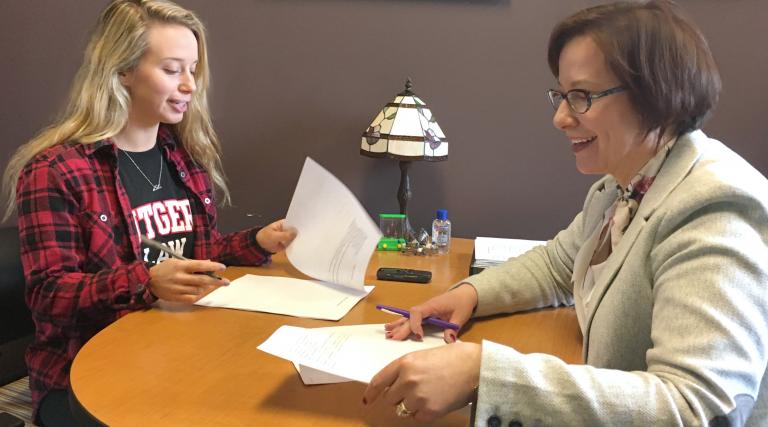Students begin to learn how to represent clients in LAWR.
Although known as Legal Analysis, Writing, and Research in Camden and Legal Analysis, Writing, and Research Skills in Newark, these two six-credit courses cover the same material. Don’t be misled by the common shorthand name, “legal writing,”—these courses teach students the analytical and communication skills that lawyers use in client representation.
Many of our professors who teach the legal analysis, writing and research courses to first-year students are leaders and innovators in the field of legal writing. U.S. News & World Report has repeatedly ranked the Rutgers program as a top-20 program, as voted by professors at other law schools. Most recently, it was ranked 16th in the nation among all law schools and 11th among public law schools (2024).
Our lawyering programs across the curriculum have developed a holistic “Orientation to Graduation” approach to preparing students for the representation of clients. As part of that, professors teaching our LAWR/LAWRS courses work with other faculty to integrate major goals of the first-year LAWR/LAWRS courses with those of the school's clinics, internal competitive appellate moot court programs, field placements, other skills courses, seminars and courses satisfying the upper-level writing requirements, and various pro bono programs.
The first-year LAWR/LAWRS courses focus on investigatory legal and factual research and intra-office or client-counseling communications in the fall, and persuasive writing and oral advocacy on behalf of the client in the spring. In both semesters, students write multiple drafts of assignments and have one-on-one meetings with professors before submitting revised drafts. Classes have a lower student-teacher ratio than most first-year classes. Writing assignments for the course typically include drafting legal memoranda, client letters, and briefs. Each semester, students have an opportunity to rewrite parts of some assignments. In addition to graded assignments, students work on both oral and written class exercises to improve their writing and analytical skills. Classes typically include simulation exercises that range from mock client interviews to mock negotiations. Legal writing fellows or teaching associates are an integral part of the writing program, and these students earn academic credit for their close work with 1L students.
Professors who teach LAWR/LAWRS are dedicated to both teaching and scholarship. They present at international, national, and cross-discipline conferences and are leaders of national legal writing organizations. They also serve as editors of peer-reviewed journals. Many of the faculty have received competitive grants for their teaching and scholarship. And several faculty members have been selected to attend scholarly writing workshops and to be facilitators at those workshops. They regularly conduct continuing legal education seminars and publish scholarship in a wide variety of legal fields.
